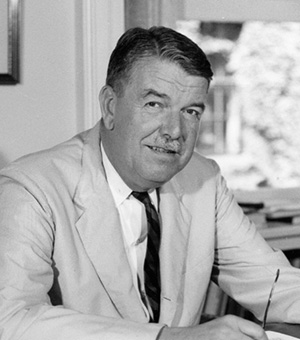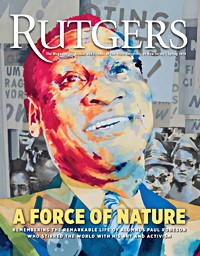Mason W. Gross
Rutgers President, 1959 to 1971

With the United States’ entry into World War II, he enlisted in the Army Intelligence Corps in 1942. Two years later he was assigned to a bomber group in Brindisi, Italy, ultimately becoming acting chief intelligence officer. In 1945 he returned home with a Bronze Star and the rank of captain. Discharged in 1945, he returned to Morningside Heights and Columbia but almost immediately decided to leave New York, and in the fall of 1946, he became assistant professor of philosophy and assistant to the dean of arts and sciences at Rutgers University. The following year he was promoted to assistant dean and associate professor.
In 1949, Mason Gross assumed the new position of provost, created by the trustees when president Robert Clothier became ill. As provost, he became the chief academic officer, and at the same time, attained the rank of full professor. Although he was the choice of many faculty members and administrators to succeed President Clothier in 1951, the trustees selected Lewis Webster Jones, a former university president. During the next eight years he continued to serve as provost, teach philosophy, and appear as “answer man” on two popular television quiz shows, Think Fast and Two for the Money, where he gained national acclaim for his scholarship and genial wit. In 1958 he took on the additional title of vice president and with the abrupt resignation of President Jones, he became acting president. In February 1959 Mason Gross was unanimously selected by the Board of Governors as the 16th president of Rutgers.
It was during the turbulent decade of the 1960s under the leadership of Mason Gross that Rutgers witnessed unprecedented growth and development. In 1959 the first of three bond issues was passed by the citizens of New Jersey, enabling the university to embark upon a $75 million building program. By 1964 enrollment had doubled with more than 12,000 full-time undergraduate students. A second public referendum yielded approximately $19 million for Rutgers, and President Gross continued to campaign for funds for the university. An additional $68 million was secured in 1968. As a result of increased public support, construction took place on every campus of the University. Seven buildings, including a library, a student center, and a law school building were erected on the 18.3-acre complex in Newark. Large-scale development occurred on the 16-acre campus in Camden, including a law school complex. A new library and dining hall were constructed at Douglass College, and new dormitories and classroom facilities sprung up on the Rutgers College campus. In 1964 Rutgers acquired from the federal government 540 acres of the former Camp Kilmer army base and the first buildings were erected on the Kilmer-area campus, where Livingston College opened in 1969. Scientific research and teaching facilities emerged on the Busch Campus.
Mason W. Gross promoted a sense of calm and reason during a decade of political action and social awareness. His defense of academic freedom was recognized with an award by the Association of University Professors.
Other sources of funding aided the development of new academic programs. In 1961 a grant of over $1 million from the W.K. Kellogg Foundation enabled Rutgers to establish a medical school. The Center for Alcohol Studies, in existence for 40 years at Yale, was moved to Rutgers in 1963, made possible by a grant from the National Institute of Mental Health. The Urban Studies Center, established in 1959, embarked on projects to increase community involvement in the urban centers of the state of New Jersey. In addition, graduate education and research expanded significantly throughout the decade. The number of doctoral programs increased from 29 to more than 50, and research opportunity in the sciences significantly increased through the receipt of federal aid by the university.
The decade was also one of political action and social awareness. President Gross promoted a sense of calm and reason when confronted with black student demands on the Newark Campus in 1969, and again with the student protests over the Vietnam War in 1971. He took an unpopular stand on academic freedom when he refused to dismiss Eugene Genovese for proclaiming publicly during a teach-in that he welcomed a Viet Cong victory in Southeast Asia. His defense of academic freedom was recognized by the Association of University Professors, which presented the university with the ninth annual Meiklejohn Award in 1966.
Throughout his tenure, Mason Gross considered himself first and foremost a teacher, and he taught philosophy each semester during his presidency. His colleagues and students considered him a masterful teacher and scholar. He also enjoyed football and rowing, and even provided personal financial support for the Rutgers crew team. No one appreciated the arts more and no one worked harder to stimulate interest in the creative and performing arts in the university and in the state. It was only fitting that the School for the Creative and Performing Arts at Rutgers was named in his honor.
Mason Gross died on October 11, 1977, in Red Bank, New Jersey, at the age of 66. He had devoted 25 years of his life to the university. During Commencement in 1971, in recognition of that service, the Board of Governors conferred upon him the only honorary degree of the day.
This biographical sketch was authored by Thomas J. Frusciano, Rutgers University Archivist. It originally appeared in The Journal of the Rutgers University Libraries.

